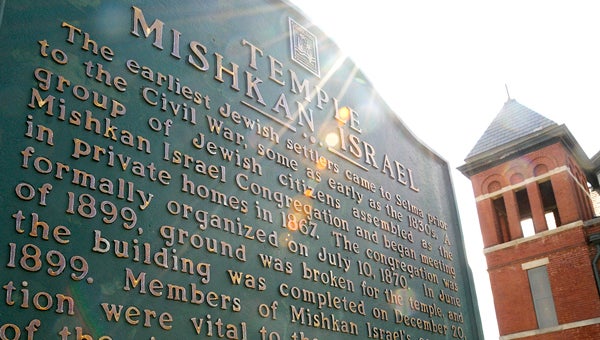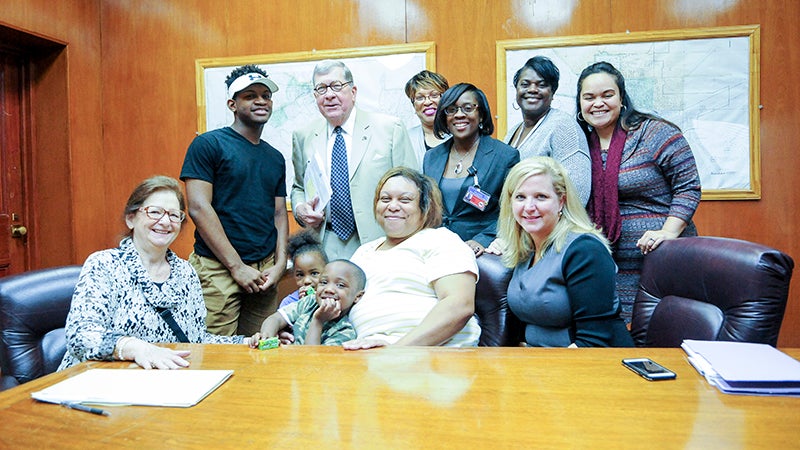Prominent New York Rabbi meets with friends in Selma
Published 1:46 pm Monday, September 10, 2012

Rabbi Peter Rubinstein, with the Central Synagogue of New York was in Selma Sunday, Aug. 19 for a special meeting at Selma’s Temple Mishkan Israel.
By Jean T. Martin
The Selma Times-Journal
On Sunday, Aug. 19, at the invitation of congregation members Ronnie Lee and Hannah Berger, more than 50 friends of Temple Mishkan Israel met to hear Rabbi Peter Rubinstein of the Central Synagogue of New York. The guests were from the Selma community at large and nearby Jewish communities.
The latter included Montgomery Temple Beth Or Rabbi Elliot Stevens and his wife, Sandy Lynn; Col. Walter Gordon, an extended family member of the Temple who splits his work time between New York and Maxwell Air Force Base; Larry Brook, Birmingham, editor and publisher of Southern Jewish Life magazine which covers stories of communities in Alabama, Mississippi, Louisiana and Florida; Barbara Fine, Destin and Birmingham, who is a descendant of the Bloch, Erdreich and Lilienthal families of Selma; Gene and Jean Harris, Marion, extended family members of the Temple; and Dr. Sheila Guidry, former local resident who now resides in Montgomery where she teaches and is an academic advisor to Auburn University Montgomery.
In addition to his position as senior rabbi of 160-year-old Central Synagogue, Rubinstein is founder and Chair of the Rabbinic Council of the World Union of Progressive Judaism in North America. He also serves on the board of several organizations including Auburn Theological Seminary, the Jewish Board of Family and Children’s Services, United Way of New York and the Rabbinic Council of HUC-JIR.
He was ranked No. 3 in Newsweek’s 2012 list of “America’s 50 Most Influential Rabbis.”
Three years ago, working with the Reform Movement, he began to visit small town congregations “in the spectrum of their facing their problems on their own. Now, in the same movement, with the same people, we do what we can by sending a rabbi down monthly to help,” he explains.
Rabbi Rubinstein spoke at length of the burning of his New York sanctuary in 1998.
“When I saw the flames I ran into the lobby and saved the only Torah. The building was badly damaged with only the walls left. But by my side were the Lutheran Archbishop and the Dean of St. Patrick’s Cathedral. So it was not a tragedy but a trauma.
“New York Mayor Juliani stood by us and in three years, on Sept. 9, 2001, in our rededicated building we blew the Shofar. Two days later, the plane hit the World Trade Center.
“That week Mayor Juliani, taking care of people all over the city, walked into our Rosh Hashanah services and stayed for the entire service, saying ‘I needed it for me.’”
Rabbi Rubinstein said he was often asked how you go on after the tragedy of Sept. 11.
“God is with me and I will not be afraid’ became my mantra. I never feel I am walking alone,” he said.
He also discussed the three major events told in the Torah: “the Exodus, Receiving of the Torah and Parting the Red Sea Waters,” calling them “Life Miracles of Redemption. I am not alone. There is going to be another chapter and our work as Jews is to make this a better world, one of life and peace, happiness, joy and comfort.”
Stepping from behind the podium to address the filled room, he said “all in life is taking measure of ourself on the arrogance and humility spectrum. Do not retaliate. After praise, be humbled. If prosperous, be kind to those who need help. Treat all persons with kindness. Speak quietly and generously to family. And take audit and reappraise ourselves.”
After the informal meeting, refreshments were served to the guests mingling informally in the filled room. The guests were also invited to view the Torah and the stained glass in the sanctuary.


